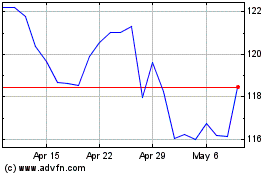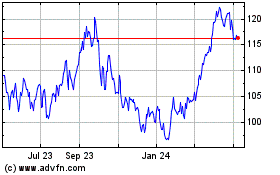By Michael C. Bender
Former Secretary of State Rex Tillerson and national economic
adviser Gary Cohn are just the latest corporate chieftains to
stumble in the transition from the autonomous confines of the
corner suite to the political pressure cooker in Washington.
It is easy to see why a cabinet post or White House position --
the frequent landing spot in Washington for senior executives --
appeals to those who have spent a career climbing to the top of the
corporate ladder.
Top executives, like politicians, must consider a myriad of
constituencies -- shareholders, workers, unions, board members,
customers -- and the best ones accommodate them all.
But the comparisons can be misleading and the success stories
are outstripped by those who have struggled, according to business
lobbyists and political strategists.
In just the past week, both Mr. Cohn, the former president of
Goldman Sachs Group Inc. , and Mr. Tillerson, who headed Exxon
Mobil Corp., ended their service in the White House in part because
they disagreed with actions taken by their new boss: President
Donald Trump.
Mr. Cohn objected to the White House decision to impose tariffs;
Mr. Tillerson differed with the president on the Iran nuclear deal
and other matters.
"The truth is they are very different environments," Mike
Feldman, a former adviser to then-Vice President Al Gore who now
provides corporate consulting, said about the transition from
business to politics.
Those who did make a broadly favorable impression, such as
former Treasury Secretary Robert Rubin, said they arrived in
Washington aware of what they don't know, not what they do
know.
After President Bill Clinton invited the co-chairman of Goldman
Sachs to join the administration in 1993, Mr. Rubin carried a
yellow legal pad, which he still has, around the nation's capital
seeking advice from veteran politicians.
"Some people who go from the corporate structure operate on the
assumption that they've had success in business and can do the same
in government," Mr. Rubin said. "But Washington is just a different
world."
One common pitfall is an impulse to rely on what worked in the
past.
Former Treasury Secretary Paul O'Neill, who was tapped by
President George W. Bush, had focused heavily on workplace safety
as chairman and chief executive at Alcoa Corp., the
Pittsburgh-based industrial giant.
When he arrived in Washington in 2001, he met Larry Summers, the
departing Treasury boss, for breakfast at the J.W. Marriott to
discuss the new job, including the issue of workplace safety at
Treasury. Mr. O'Neill recalled that Mr. Summers turned to his chief
of staff, Sheryl Sandberg, the current chief operating officer of
Facebook Inc., and asked if she knew what Mr. O'Neill was talking
about.
"Larry Summers was sitting on top of a workforce population of
125,000, and he didn't have a clue about workplace safety -- not a
clue," Mr. O'Neill said in an interview.
In the noisy, hot aluminum plants where workers wield vibrating
hand tools and can be exposed to ultraviolet radiation, safety is
paramount. But at Treasury, Mr. O'Neill's initiative became a
running joke as workers teased that their biggest risk was paper
cuts, said Charles Duhigg, an author who wrote about Mr. O'Neill in
his book, "The Power of Habit."
"At Alcoa, he was lioned for his focus on safety," Mr. Duhigg
said. "At Treasury, it didn't really matter."
Mr. O'Neill was forced out of the Bush administration in 2002
after repeated battles with the West Wing over increasing budget
deficits. One takeaway from his government service that he still
prides: The number of workplace injuries at the agency
significantly dropped under his watch.
CEOs must be adept at navigating internal politics. But in
Washington, victories are often claimed in the face of what would
otherwise look like defeats.
Veterans Affairs Secretary Bob McDonald stepped away as chief
executive of Procter & Gamble Co. in 2014 to take over an
agency in crisis.
The longtime Republican joined President Barack Obama's
administration, with a mission to improve access to the nation's
largest health-care system. His progress has been hailed by
health-care officials, military advocates and Harvard Business
School.
But years later what is still gnawing at him is the legislation
that failed because, in his view, Republicans wanted the bill to
pass under a different president.
"The biggest frustration is the politics," Mr. McDonald said
about his time in office. "It gets in the way of doing what's right
for the people. The idea that there is an opposition party? You
have people behaving counter to what you're trying to do, even
though they know it's going to hurt veterans."
In an act of quiet rebellion, Mr. McDonald said he dropped his
party affiliation when he left Washington. Now semiretired in
Florida, he is a registered independent.
In the business world, executives have often been groomed for
succession, and know their companies extremely well.
"One thing I can tell you, unequivocally, is that there were no
surprises with Rex," said William Howell, whose two decades on the
Exxon board included the 2006 election of Mr. Tillerson as the
company's chairman and chief executive. "Exxon has one of the most
intense internal management processes I have every viewed in
corporate America," he said.
Being installed atop an established agency like the State
Department -- with a budget of $55 billion (about one-fourth of
Exxon's) and a range of staff that includes the foreign service,
career staff in Washington and dozens of political appointees --
presents a sharp learning curve that must be mastered in a very
short amount of time.
For Mr. Tillerson, time ran out on Tuesday when he learned he
had been fired by way of a presidential tweet.
"If you want to get anything done, you have to have people
around you who know how the levers work," said Mike Leavitt, chief
executive of a regional insurance company before becoming governor
of Utah in 1993. He later served as Environmental Protection Agency
administrator and secretary of Health and Human Services under
George W. Bush.
"It was a profound epiphany for me when I realized that if you
come into government without understanding how it works -- its
limitations and its strengths -- you can be confounded in many
different ways," Mr. Leavitt said.
Write to Michael C. Bender at Mike.Bender@wsj.com
(END) Dow Jones Newswires
March 14, 2018 05:44 ET (09:44 GMT)
Copyright (c) 2018 Dow Jones & Company, Inc.
Exxon Mobil (NYSE:XOM)
Historical Stock Chart
From Mar 2024 to Apr 2024

Exxon Mobil (NYSE:XOM)
Historical Stock Chart
From Apr 2023 to Apr 2024
